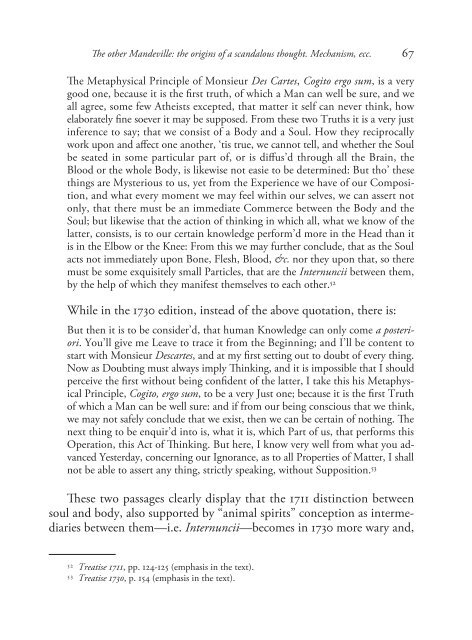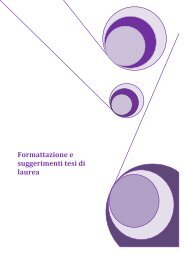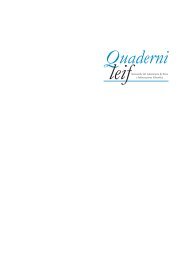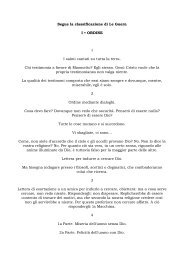qui - maria vita romeo
qui - maria vita romeo
qui - maria vita romeo
You also want an ePaper? Increase the reach of your titles
YUMPU automatically turns print PDFs into web optimized ePapers that Google loves.
e other Mandeville: the origins of a scandalous thought. Mechanism, ecc. 67<br />
e Metaphysical Principle of Monsieur Des Cartes, Cogito ergo sum, is a very<br />
good one, because it is the first truth, of which a Man can well be sure, and we<br />
all agree, some few Atheists excepted, that matter it self can never think, how<br />
elaborately fine soever it may be supposed. From these two Truths it is a very just<br />
inference to say; that we consist of a Body and a Soul. How they reciprocally<br />
work upon and affect one another, ‘tis true, we cannot tell, and whether the Soul<br />
be seated in some particular part of, or is diffus’d through all the Brain, the<br />
Blood or the whole Body, is likewise not easie to be determined: But tho’ these<br />
things are Mysterious to us, yet from the Experience we have of our Composition,<br />
and what every moment we may feel within our selves, we can assert not<br />
only, that there must be an immediate Commerce between the Body and the<br />
Soul; but likewise that the action of thinking in which all, what we know of the<br />
latter, consists, is to our certain knowledge perform’d more in the Head than it<br />
is in the Elbow or the Knee: From this we may further conclude, that as the Soul<br />
acts not immediately upon Bone, Flesh, Blood, &c. nor they upon that, so there<br />
must be some ex<strong>qui</strong>sitely small Particles, that are the Internuncii between them,<br />
by the help of which they manifest themselves to each other. 52<br />
While in the 1730 edition, instead of the above quotation, there is:<br />
But then it is to be consider’d, that human Knowledge can only come a posteriori.<br />
You’ll give me Leave to trace it from the Beginning; and I’ll be content to<br />
start with Monsieur Descartes, and at my first setting out to doubt of every thing.<br />
Now as Doubting must always imply inking, and it is impossible that I should<br />
perceive the first without being confident of the latter, I take this his Metaphysical<br />
Principle, Cogito, ergo sum, to be a very Just one; because it is the first Truth<br />
of which a Man can be well sure: and if from our being conscious that we think,<br />
we may not safely conclude that we exist, then we can be certain of nothing. e<br />
next thing to be en<strong>qui</strong>r’d into is, what it is, which Part of us, that performs this<br />
Operation, this Act of inking. But here, I know very well from what you advanced<br />
Yesterday, concerning our Ignorance, as to all Properties of Matter, I shall<br />
not be able to assert any thing, strictly speaking, without Supposition. 53<br />
ese two passages clearly display that the 1711 distinction between<br />
soul and body, also supported by “animal spirits” conception as intermediaries<br />
between them—i.e. Internuncii—becomes in 1730 more wary and,<br />
52 Treatise 1711, pp. 124-125 (emphasis in the text).<br />
53 Treatise 1730, p. 154 (emphasis in the text).








